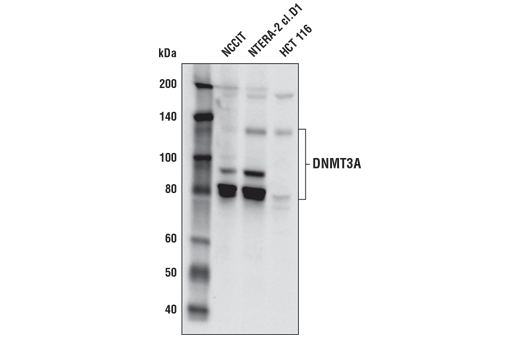
产品介绍
产品信息
抗原名称
DNMT3A

来源纯化
使用与人 DNMT3A 蛋白中 Pro233 周围的残基相对应的合成肽对动物进行免疫接种来产生单克隆抗体。

宿主
Rabbit

简单描述
Monoclonal Antibody for studying DNMT3A. Cited in 13 publications. Validated for WB, IP, IF, F, ChIP, ChIP, C&R, C&T. Highly specific and rigorously validated in-house, DNMT3A (D2H4B) Rabbit Monoclonal Antibody (CST #32578) is ready to ship.

商品描述
Product Usage Information
For optimal ChIP and ChIP-seq results, use 10 μl of antibody and 10 μg of chromatin (approximately 4 x 106 cells) per IP. This antibody has been validated using SimpleChIP® Enzymatic Chromatin IP Kits.The CUT&RUN dilution was determined using CUT&RUN Assay Kit #86652. The CUT&Tag dilution was determined using 100,000 cells in a total reaction volume of 100 μl.
| Application | Dilution |
|---|---|
| Western Blotting | 1:1000 |
| Immunoprecipitation | 1:50 |
| Immunofluorescence (Immunocytochemistry) | 1:800 - 1:1600 |
| Flow Cytometry (Fixed/Permeabilized) | 1:1600 |
| Chromatin IP | 1:50 |
| Chromatin IP-seq | 1:50 |
| CUT&RUN | 1:50 |
| CUT&Tag | 1:50 |

分子量
130, 95, 85

研究领域
癌症,发育生物学与干细胞研究,表观遗传学,神经科学,

应用
反应种属
Human

目标/特异性
Specificity/Sensitivity
DNMT3A (D2H4B) 兔单克隆抗体 可检测 DNMT3A 总蛋白的内源水平。该抗体可检测 DNMT3A 的多个同工型,包括同工型 1 和同工型 2。该抗体不与 DNMT3B 蛋白或其他 DNMT 蛋白交叉反应。
物种反应性:
人

敏感性
Endogenous

背景
背景
在哺乳动物细胞中,DNA 胞嘧啶残基甲基化是一种可遗传的表观遗传修饰,对于基因表达、基因组印记和发育的正确调节起着关键作用 (1,2)。已经确定三个哺乳动物 DNA 甲基转移酶家族:DNMT1、DNMT2 和 DNMT3 (1,2)。DNMT1 在增殖细胞中具有结构性表达,是一种维持型甲基转移酶,在复制过程中将正确的甲基化模式转为新合成的 DNA。DNMT3A 和 DNMT3B 在胚胎干细胞中高表达,但在成年体细胞组织中的表达降低。DNMT3A 和 DNMT3B 是从头合成甲基转移酶,即甲基化之前未甲基化的 DNA 区域。DNMT2 在成年体细胞组织中呈低水平表达,其失活状态对重新或维持 DNA 甲基化没有影响。DNMT1、DNMT3A 和 DNMT3B 共同组成一个蛋白复合体,该复合体与组蛋白去乙酰酶 (HDAC1、HDAC2、Sin3A)、转录抑制蛋白(RB、TAZ-1) 和异染色质蛋白 (HP1、SUV39H1) 相互作用,以维持恰当的 DNA 甲基化水平并促进基因沉默 (3-8)。不恰当的 DNA 甲基化会导致癌症等疾病 (1,2)。抑癌基因中启动子 CpG 岛的过甲基化与基因沉默和癌症发生有关。此外,大多数基因组 DNA 的低甲基化与癌症发病有关并且可能导致癌症发病。除了结肠癌、乳腺癌和胃癌之外,DNMT1、DNMT3A 和 DNMT3B 还在许多癌症(包括急性和慢性髓细胞性白血病)中过表达 (9-12)。
1.Hermann, A. et al. (2004) Cell. Mol. Life Sci. 61, 2571-87.
2.Turek-Plewa, J. and Jagodziński, P.P. (2005) Cell. Mol. Biol. Lett. 10, 631-47.
3.Kim, G.D. et al. (2002) EMBO J. 21, 4183-95.
4.Fuks, F. et al. (2001) EMBO J. 20, 2536-44.
5.Geiman, T.M. et al. (2004) Biochem. Biophys. Res. Commun. 318, 544-55.
6.Rountree, M.R. et al. (2000) Nat. Genet. 25, 269-77.
7.Pradhan, S. and Kim, G.D. (2002) EMBO J. 21, 779-88.
8.Fuks, F. et al. (2003) Nucleic Acids Res. 31, 2305-12.
9.Mizuno, S. et al. (2001) Blood 97, 1172-9.
10.Robertson, K.D. et al. (1999) Nucleic Acids Res. 27, 2291-8.
11.Xie, S. et al. (1999) Gene 236, 87-95.
12.Kanai, Y. et al. (2001) Int. J. Cancer 91, 205-12.

翻译后修饰
Unmodified

制备和贮存
保存方式
Supplied in 10 mM sodium HEPES (pH 7.5), 150 mM NaCl, 100 µg/ml BSA, 50% glycerol and less than 0.02% sodium azide. Store at –20°C. Do not aliquot the antibody.
数据库链接
Entrez-Gene ID
1788

UniProt ID
Q9Y6K1

声明 :本官网所有报价均为常温或者蓝冰运输价格,如有产品需要干冰运输,需另外加收干冰运输费。








 用小程序,查商品更便捷
用小程序,查商品更便捷







 危险品化学品经营许可证(不带存储) 许可证编号:沪(杨)应急管危经许[2022]202944(QY)
危险品化学品经营许可证(不带存储) 许可证编号:沪(杨)应急管危经许[2022]202944(QY)  营业执照(三证合一)
营业执照(三证合一)